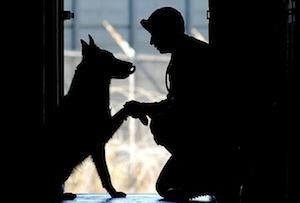How Animals Provide Therapy for Those with PTSD

For those with PTSD, at times a physician may prescribe counselling, medication, group work or talking with other PTSD individuals. They may also prescribe alternative treatments with service animals to help the person feel more comfortable and deal with their challenges relating to PTSD at home. Here are a few ways animals provide therapy for people with PTSD.
Psychiatric Service Dogs
Psychiatric service dogs are one alternative treatment for individuals with PTSD. These dogs are specially trained in obedience, performing tasks, and working in public environments to help their partner manage their PTSD more successfully. They perform tasks and enable their partner to be productive. For example, a psychiatric service dog may prevent an individual with PTSD from wandering away during a flashback. The dog helps the person return to familiar surroundings or to return home. Psychiatric service dogs also are capable of guiding their partner to a person who can offer help or support.
Psychiatric service dogs also make individuals with PTSD feel safe in their own homes. Sometimes, people with PTSD are unable to enter their homes because they believe there is an intruder or other threat inside. The dog will perform a systematic search of the home or room and bark if it finds someone. If the dog returns to the partner, the person with PTSD knows it is safe to enter the home and that their fear is a symptom of their disorder, rather than the result of a real threat.
Service dogs also are trained to bring help to a person with PTSD. For example, if the individual experiences an intense flashback, the dog can get a loved one or a neighbor for help. In cases where the individual is able to phone 911 for help but then hides, the dog can guide emergency personnel to the partner when help arrives.
Veterans and PTSD Service Dogs
Veterans are experiencing great success in overcoming PTSD, thanks to their PTSD service dogs. The dogs help veterans express their feelings and emotions, and they aid them in building trust and affection toward their loved ones when they return home from war. The dogs help veterans with PTSD communicate without being aggressive, and they help them move beyond their emotional numbness. In some cases, PTSD dogs help veterans sleep better because they feel more secure knowing that their service dog is keeping watch during the night.
Equine Therapy for Those Who Suffer from PTSD
Veterans and other people who suffer from PTSD also are reaping the benefits of working with horses. Equine therapy gives people the opportunity to interact with animals and feel more relaxed as a result of the time spent connecting with the horses. The person is able to focus on the horse, rather than his problems. The ranches and facilities are peaceful and quiet and give the person with PTSD the chance to enjoy time outside and relax. Eventually, their self-esteem and confidence start to grow, and they care for the horses and begin to ride without fear. They enjoy themselves and have fun while bonding with the horses and other PTSD patients.
Dogs, horses, and other animals provide companionship and comfort to people who struggle with PTSD. Psychiatric service dogs especially help people live with PTSD on a daily basis, and equine therapy helps people with PTSD relax and boost their mental health in positive ways.
Image via Pixabay by skeeze